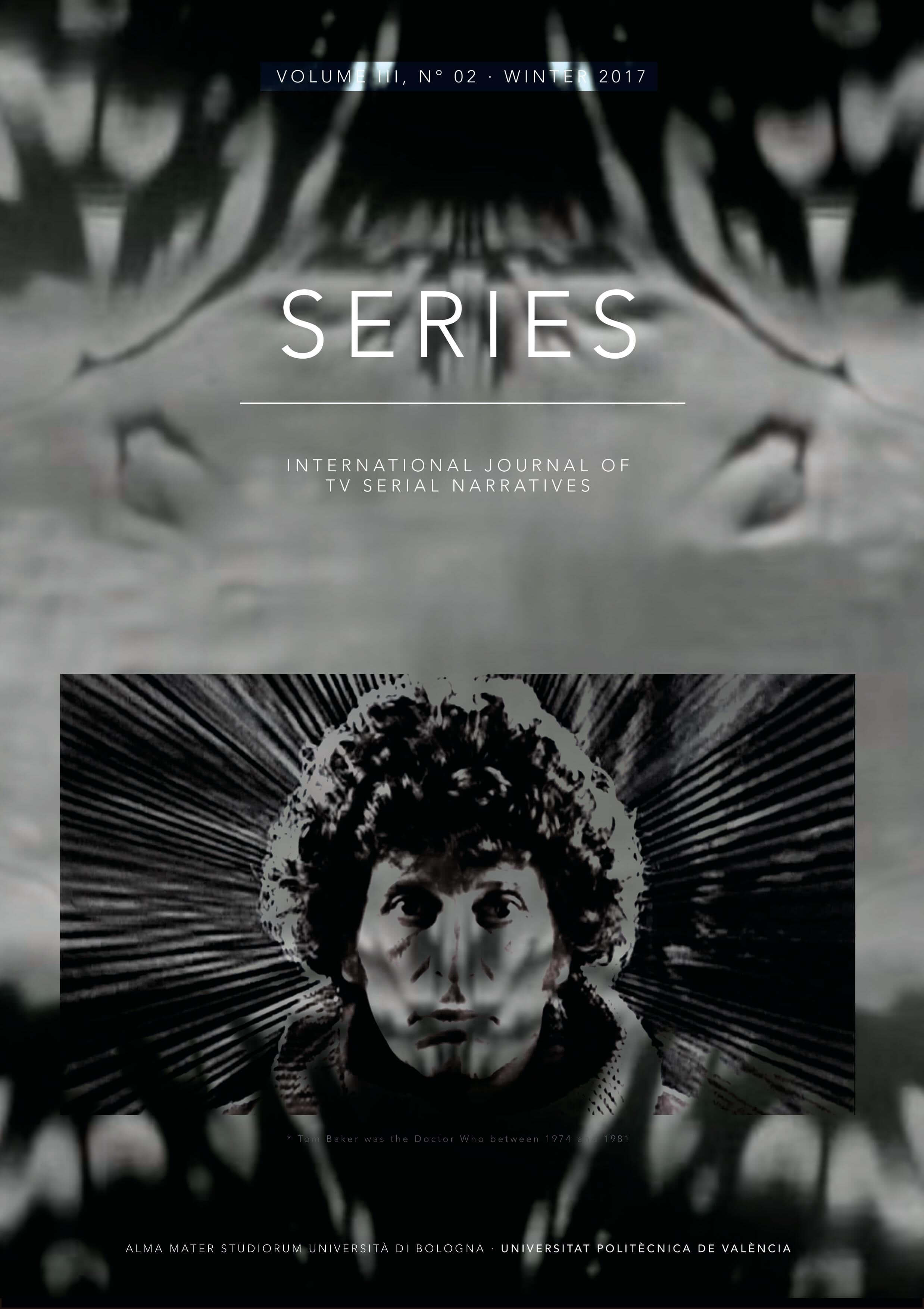Un Village français. A French auteur(s) series on a public network
DOI:
https://doi.org/10.6092/issn.2421-454X/7632Parole chiave:
France, public network, auteur series, production, writing process, television directing, history, economyAbstract
This article is a case study of the French TV series Un Village français, broadcast on France 3 from 2009 to 2017. Based on interviews and observations of the cast and crew members, it attempts to unravel the relationships between writers, producers, directors and broadcasters within the French television industry. First, some particularities of television production in France are briefly addressed. These include: the limited number of channels commissioning original TV series; the still unestablished concept and professional practice of showrunners and the lack of an industrialized process in creating televised serial narratives; and the dominant status of directors, which contributes to the weakened position of TV writers within this economy. The focus of the article is then the pre-broadcast history of the series, from the early stages of its conception to the later stages of its production. Un Village français is indeed created by an a-typical trio of executive co-producers: a producer (Emmanuel Daucé), a writer (Frédéric Krivine) and a director (Philippe Triboit), championed by a non-executive head producer (Jean-François Boyer). Eventually winning over reluctant channel executives, their stubbornness and ambition was rewarded by prime-time airings on a public channel of what is now widely regarded like a show bearing the marks of authorship. The aim is to understand the creative and economic processes at stake, and their impact on the narrative.Riferimenti bibliografici
Azéma, Jean-Pierre (2017). Interview conducted by the Author, March 18th.
Bourdon, Jérôme (2008). “Self-inflicted imperialism. On the early Americanization of European television.” In We Europeans? Media, Representations, Identities, edited by William Uricchio, 93-108. London: Intellect.
Bourdon, Jérôme (2011). Du service public à la télé-réalité. Une histoire culturelle des télévisions européennes, 1950-2010. Bry s/Marne: INA Editions.
Boutet, Marjolaine (2012). “Un Village français (Saison 4): Penser l’impensable.” Le Monde. Blog ‘séries télévisées’. http://seriestv.blog.lemonde.fr/2012/03/27/un-village-francais-saison-4-penser-limpensable/ (last accessed 17-08-17).
Boutet, Marjolaine (2014). “Depuis quand les Français sont-ils accros aux séries télé?” Inaglobal. http://www.inaglobal.fr/television/article/depuis-quand-les-francais-sont-ils-accros-aux-series-tv-7551 (last accessed 12-03-16).
Boutet, Marjolaine (2017). Un Village français: une histoire de l’Occupation. Paris: La Martinière.
Boyer, Jean-François (2016). Interview conducted by the Author, March 16th.
Laurent Cavalier (2016). Interview conducted by the Author, June 6th and 7th.
Chalvon-Demersay, Sabine and Dominique Pasquier (1991). “La naissance d’un feuilleton français.” Réseaux hors série.
CNC (2014). Les coûts de production des films en 2013. Annual public report.
Constant, Caroline (2007). “La disparition de Patrick Péchoux.”. L’Humanité. http://www.humanite.fr/node/368048 (last accessed 17-03-16).
Cornillon, Claire (2014). La séquence prégénérique dans les séries télévisées américaines: le cas de The X-Files. Master’s dissertation. Université de Paris 3. https://www.academia.edu/9605193/La_s%C3%A9quence_pr%C3%A9g%C3%A9n%C3%A9rique_dans_les_s%C3%A9ries_t%C3%A9l%C3%A9vis%C3%A9es_am%C3%A9ricaines_le_cas_de_The_X-Files (last accessed 19-03-16).
Daucé, Emmanuel (2016-2017). Interview conducted by the Author, April 22nd, 2016; January 9th, 2017.
Carole Desbarats (2016). Interview conducted by the Author, November 4th.
Doury, Laurence (2011). ‘“Comment analyser les publics des series télévisées”. In Décoder les séries télévisées, edited by Sarah Sépulchre, 151-78. Brussels: De Boeck.
Kirschbacher, Felix, and Sven Stollfuss (2015). “Von der TV- zur AV-Serie. Produktions-, Distributions- und Rezeptionsformen aktueller Serien”. Merz: Medien + Erziehung. Zeitschrift für Medienpädagogik 4 : 21–8.
Krivine, Frederic (2014-2017). Interviews conducted by the Author, May 19th and June 11th, 2014; March 3rd and October 21st, 2016; May 8th and July 14th, 2017.
Manileve, Vincent (2014). “Les séries françaises manquent-elles d’audace?” Inaglobal. http://www.inaglobal.fr/television/article/les-series-francaises-manquent-elles-d-audace-7846 (last accessed 15-03-16).
Mille, Muriel (2006). Analyse du processus d’écriture d’un scénario de série télévisée : l’exemple de la série PJ. Master’s dissertation. Lyon : ENS-LSH.
Mille, Muriel (2016). “Le processus collectif de création d’un feuilleton télévisé. Une division du travail d’auteurs.” Sociétés contemporaines 101: 91-114.
Pasquier, Dominique and Sabine Chalvon-Demersay (1995). Les scénaristes de télévision. Paris: Nathan.
Savoir au Présent (2013). Télémaques 2012/2013. Un Village français épisode 25 – Saison 4: Le train. Research report. Le Kremlin-Bicêtre: cultural association.
Sauvage, Monique and Isabelle Veyrat-Masson (2014). Histoire de la télévision française. Paris: Nouveau Monde Editions.
Sérisier, Pierre (2017). L’Empire de la mélancolie: l’univers des séries scandinaves. Paris: Vendémiaire.
Triboit, Philippe (2016). Interview conducted by the Author, March 3rd and May 10, 2016.
Zemniak, Pierre (2017). Exception française: de Vidocq au Bureau des Légendes, 60 ans de séries. Paris: Vendémiaire.
TV series and films cited
Le Chagrin et la Pitié (1971)
La Commune (2007)
Deadwood (2004-2006)
Dix Pour Cent (2015-)
Engrenages (2005-)
E.R. (1994-2009)
Fais pas ci, fais pas ça (2007-2017)
Les Fusillés (2015)
Un héros très discret (1996)
Homicide: Life on the Street (1993-1999)
L’Instit (1993-2005)
Joséphine ange gardien (1997-)
Julie Lescaut (1992-2014)
Lacombe Lucien (1974)
La Ligne de Démarcation [film ] (1966)
La Ligne de Démarcation [TV series] (1977)
La Maison des bois (1971)
Monsieur Klein (1976)
Navarro (1989-2007)
Nom de Code DP (2004).
NYPD Blue (1993-2005)
P.J. (1997-2009)
Plus Belle La Vie (2004-)
Rome (2005-2007)
Le 16 à Kerbriant (1972)
The Sopranos (1999-2007)
O thiasos (Le Voyage des comédiens, 1975)
Le Train de 16h19 (2003)
Un Village français (2009-2017)
Downloads
Pubblicato
Come citare
Fascicolo
Sezione
Licenza
Copyright (c) 2017 Marjolaine Boutet
La rivista è rilasciata sotto una licenza Creative Commons Attribuzione 4.0 Internazionale (licenza completa).
Vedere anche la nostra Open Access Policy.





